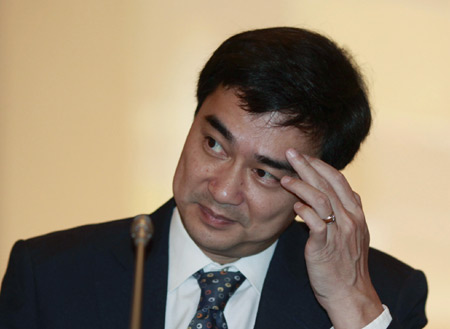Asia-Pacific
Thai PM lifts curfew, keeps state of emergency
(Agencies)
Updated: 2010-05-30 09:23
 |
Large Medium Small |
|
 Thailand's Prime Minister Abhisit Vejjajiva gestures during a meeting with foreign journalists at the Government House in Bangkok May 29, 2010. Vejjajiva said on Saturday that it would be difficult to hold elections this year, which is likely to infuriate anti-government protesters involved in deadly riots last week. [Photo/Agencies] |
BANGKOK - Thailand's prime minister lifted a nighttime curfew in Bangkok and other areas on Saturday, saying that order has been restored 10 days after a violent confrontation with anti-government protesters killed more than a dozen people and left parts of the capital in flames.
|
||||
Abhisit, who spoke at a press conference for foreign journalists, also said he would not rule out an election before the end of his government's term late next year, though it would be "difficult" to hold the polls this year.
His aide, Sirichoke Sopha, said the 10-night-old curfew was being lifted in Bangkok and 23 other provinces because there were no more fears of immediate flare-ups from anti-government "Red Shirt" protesters who occupied the heart of Bangkok for weeks in demonstrations that ended May 19 in a military crackdown.
Concerns have also been raised about the economic impact of the curfew on local businesses.
The curfew was imposed after the crackdown dispersed thousands of the anti-government protesters from their barricaded camp in one of Bangkok's most upscale shopping and tourist districts. Militants afterward went on a spree of destruction, attempting to burn down more than 30 buildings, including the country's stock exchange and largest shopping mall.
The military operation and the subsequent riots killed more than a dozen people and injured nearly 200. All told, 88 people _ most of them protesters _ died in street clashes, mysterious grenade attacks and sniper fire during the protests, which started peacefully more than two months ago.
Officials say the Red Shirt movement, which wants Abhisit to resign and call early elections, is not over and is regrouping. But no significant violence has been reported in Bangkok after troops forced the end of the protests and cleaned up sporadic resistance.
Abhisit, whose public statements at the beginning of the crisis were terse and infrequent, spoke confidently for an hour in defending his government's handling of the crisis and outlining its plans for moving forward. He discussed in detail accusations that the military used inappropriate force in quelling the protest.
"It has always been our policy to seek a peaceful resolution of the problem and exercise utmost restraint," he said, explaining that his main goal was always minimal loss of life.
Critics have accused the army of shooting unarmed demonstrators, including medical workers. The government blames armed elements among the demonstrators for many of the casualties, but has promised a full, independent investigation.



